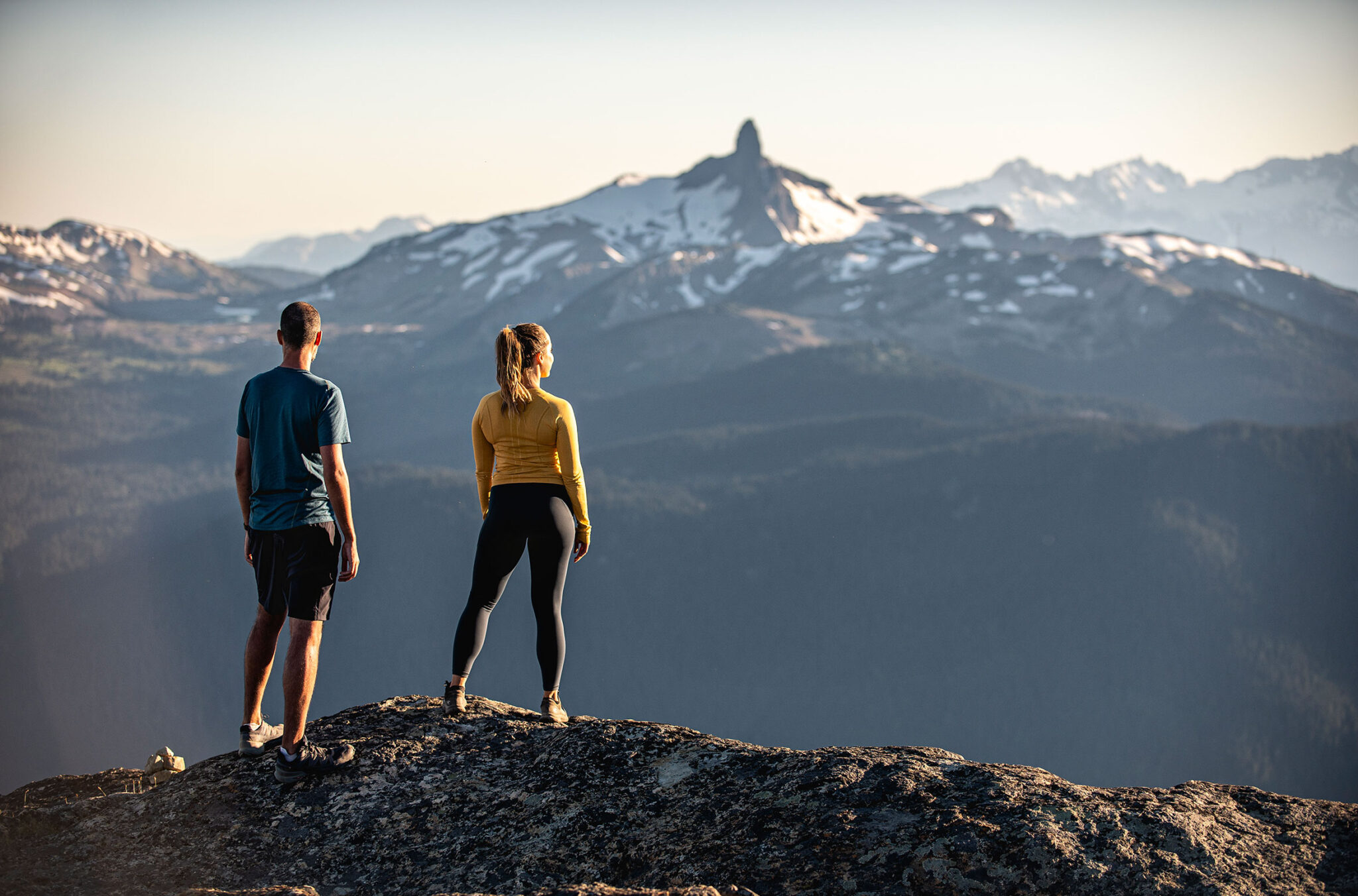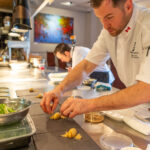Travelling intentionally isn’t easy. It means slowing down, considering your impact, exploring the lesser known and making connections with the people in the places you go. Whistler is the perfect place to do just that and there isn’t an ounce of adventure or good summer vibes that need to be sacrificed in the process.
This summer, plan a Whistler trip that allows you to avoid peak periods and gets you exploring the peaks, trails, and water in a way that is sensitive to the spectacular, mountain environment. Then, meet some local businesses who’ve got offerings designed to make you feel good about how you spend your time here.
Here’s a three-day itinerary designed with sustainable travel top of mind.
Sustainable Pre-Trip Tips
- Book midweek. Staying midweek is not only better value and generally a quieter and more relaxing experience, but it also helps with the sustainability of Whistler’s infrastructure.
- Travel to Whistler via shuttle to lessen your carbon footprint (and so you can enjoy the epic views of the Sea to Sky).
- Leave the car at home. Read more in 8 Reasons to Go Car Free in Whistler.
- Bring your reusable water bottle (Whistler water is safe to drink from the tap) and shopping bags.
Sustainable Summer Stay Day 1:
Accommodation: Stay Somewhere That Cares
Most of Whistler runs on hydroelectric power, which means your stay is likely to generate less carbon than in other resorts which might rely on fossil fuels. Most of the hotels and accommodation properties in Whistler have sustainability initiatives such as in-room recycling, an opt-out of daily linen changes (for water conservation), EV parking options and energy-conserving building systems. A couple of interesting ones include:
The Four Seasons Resort Whistler tracks its energy, carbon, water and waste, and is able to drill down to what each room in the hotel is using. They then use this data to come up with ways they can reduce each element, like by installing smart thermostats and flow rate restrictors.
Fairmont Chateau Whistler has its own Sustainability Team whose initiatives you can read more about in Trash Talk with Sustainability Chair, Fairmont Chateau Whistler. They also have pollinator bee hotels, which play an integral role in the health and growth of their rooftop garden.
With all of the shopping options here, Summit Lodge knows it’s easy to end up with a little more than you brought. But what to do with the items you can’t squeeze into your suitcase? You can pop them in the “One Less Thang” box, provided in the room. The hotel staff will see that it’s diverted from the landfill (if in useable condition) and donated to a community program like the Whistler Re-Use-It Centre.
Get Outside: Lost Lake Park
After you’ve checked in, get some fresh mountain air by taking a walk, run or bike around Lost Lake Park, which is located right next to Whistler Village.
There’s a hiking-only, nature trail which starts on the right-hand side of the main entrance, by the PassivHaus (check out the panels around the PassivHaus which explain its design and history). A gift from the Swiss, it’s an excellent example of how Passivhaus buildings work. It’s also where you can rent a bike if you want to try the cross-country trails on two wheels.
If you enjoy the trail system around Lost Lake, you could consider giving back to them. You can support WORCA, who build and maintain a lot of Whistler’s trails, by donating, becoming a member and joining a volunteer trail-building night. Get the latest trail updates, know the riding code and connect with the biking community over at Whistler Off-Road Cycling Association (WORCA).
Visit the Squamish Lil’wat Cultural Centre
Near the entrance of Lost Lake Park, is the Squamish Lil’wat Cultural Centre (SLCC). Part of travelling intentionally is about making connections with the people and community of the place you visit. The Sḵwx̱wú7mesh and the Lil̓wat7úl First Nations have been on the land we now call Whistler since time immemorial. On a visit to the SLCC, you can connect with Cultural Ambassadors as they share a traditional drum song, inspiring short film and take you on a guided tour, so you can better understand the people of the land you’re exploring.
You’ll see towering carved house posts, canoes, weaving, regalia, bold artwork and artifacts throughout the museum and its galleries. The summer is a lovely time to explore their interpretive forest walk called the Salish Stroll.
Dinner: Alta Bistro
Alta Bistro has had a firm farm-to-table mandate since it opened its doors in 2011. It takes a long time to develop a working relationship like this, and for small businesses, it’s even harder to stay connected to them as prices rise.

At Alta Bistro you’ll always find seasonal, local produce on the menu with a dedication to quality ingredients that shine on the plate. Araxi Restaurant + Oyster Bar is another award-winning restaurant that shares a similar mentality.
Après/Evening Option: RMU Whistler
Located in the Upper Village, RMU Whistler is not only a hub for great outdoor gear (made sustainably) and craft beer, but it’s also a place firmly connected with the Whistler community. On their social feed, you’ll find events that give back to local charities, bring outdoor enthusiasts together for info sessions, and give a stage to the next up-and-coming music or comedy act. We’re also fans of their weekly quiz night, which is definitely one way to meet new people.
View this post on Instagram
You’ll likely spot Coast Mountain Brewing and Whistler Brewing Company on the taps around Whistler, both breweries can be found in Function Junction (you can ride a bike/e-bike on the Valley Trail to get there). They are also incredible supporters of local charities and organizations, so you can feel good about every sip you have!
Sustainable Summer Stay Day 2:
Breakfast: Naked Sprout Café
Naked Sprout is all about healthy, comfort eating. Working with farmers based in Pemberton, small-batch, Whistler-based coffee grinders and even local foraging companies, they have a vegetarian and vegan-forward menu that’s as delicious as it is good for you.
View this post on Instagram
For breakfast, we’re fans of their Tofu Scramble English Muffin and Millennial Toast. All their fresh juices are made-to-order, which reduces waste and packaging. We’d also suggest picking something up for lunch as it’s going to be a full, activity-based day! The Green Moustache is another option for an incredible vegan and veggie-based breakfast.
Morning Activity: Kayaking the River of Golden Dreams
Founded in 1985, Backroads Whistler is a pioneer of eco-tourism in the area. Eric Wight, the owner, consciously decided to keep the sightseeing adventures people-powered over motorized, to lessen the effects on the environment.
Backroads helps you explore Whistler’s waterways by canoe, kayak or SUP with guided tours or rentals (including multi-day). Knowing how important the health of these ecosystems is, they hold community clean-ups of the lakes and the River of Golden Dreams. This summer, Eric hopes to see the placement of a new state-of-the-art fish ladder, which will help with fish migration and allow for canoe and kayak passage without scraping the bottom.
View this post on Instagram
Cleverly, at their rental base in Lakeside Park, they also offer a frozen treat to any kid who picks out five or more pieces of litter from the lake. They also find a second life for their life jackets. When they’re no longer picture-perfect but still completely usable, they are donated to community groups.
Afternoon Activity: Ziptrek Ecotours
Charles Steele and David Udow, the co-founders of Ziptrek Ecotours, wanted to create an adventure-based learning experience. They opened the very first, guided zipline tour in North America right here in Whistler back in 2002. While on tour, guests can learn about the coastal temperate rainforest and The Natural Step, a framework for making sustainable decisions. The President of The Natural Step claims Ziptrek has been the biggest driver of public awareness for the program to date.
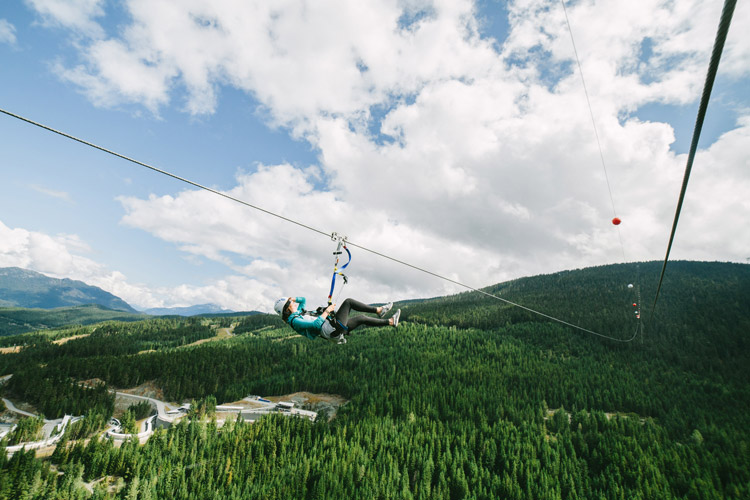
But don’t worry, just because they’re big on nature doesn’t mean they’re light on thrill – Ziptrek Ecotours is home to four distinct zipline tours from the family-friendly Bear Tour to the longest zipline in the US and Canada, The Sasquatch®. Ziptrek is a great example of eco-adventure and if you want to learn more about their initiatives, take a read of our dedicated blog.
Dinner: The Raven Room
The Raven Room is known for its artisan cocktails and delicious, locally-sourced menu items but what you might not know is that they also focus on designing waste out of their system. This means they actively think about how to reduce waste coming into their business, and also devise imaginative ways for using it when it does.
For example, in their Loose Morels cocktail, they mushroom-butter wash the Hennessy VS to give it a rich, umami flavour. They then strain the mushroom butter out of the cognac and add it to their risotto for a delicious, flavour bomb. We should also add that the mushrooms they used are harvested by Whistler Harvest just down the highway in Paradise Valley (Squamish).

They have a lone mason jar which sits behind the bar and gets used primarily for the non-recyclable, crinkly plastic wrap that seals most alcohol bottles. They empty this once a day, otherwise, it’s bottle recycling and compost only for the team at The Raven Room.
To read about other Whistler restaurants that are innovating in the food and beverage space, take a read of Whistler Restaurants That Think Beyond the Menu.
Sustainable Summer Stay Day 3:
Breakfast: Make it Local
Go for Hunter Gather or Caramba in Whistler Village, both are locally owned and operated, with a focus on local produce, and with vegan and vegetarian options on the menu. If you’re in Creekside, BReD is a B-corp with an incredible mission to prove that vegan baking is just as good as animal-based. We’ve tried their cinnamon buns and can attest to this being very true. Also, if you buy two coffees, they plant a tree!
View this post on Instagram
All-Day Activity: Sightseeing and Hiking on Whistler Blackcomb
Whistler Blackcomb is a leader in its industry with impressive initiatives around energy conservation and renewable sources, waste management and public education. They released a documentary series called The Big Picture, which explores our responsibility towards the outdoor places we play, visit and call home. It is definitely worth a watch.
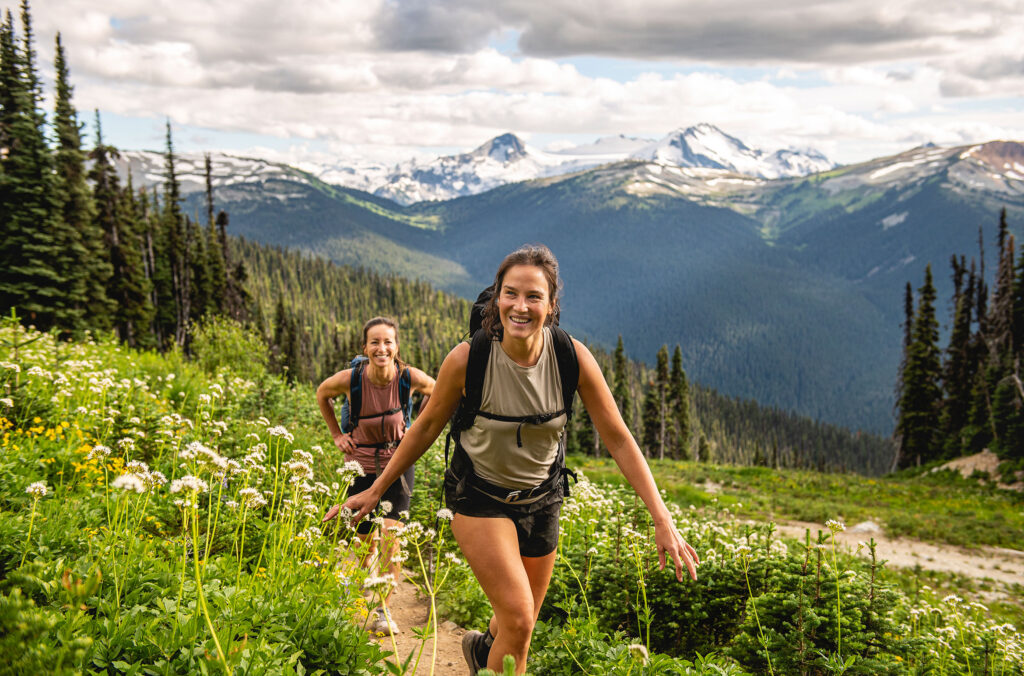
Whistler Blackcomb is striving for a zero operating footprint by 2030 and has been able to reduce the amount of energy used and waste sent to landfills even with an increase in visitors.
With so many hiking trails that lead you through fascinating mountain microclimates up to stunning vistas, it’s no wonder hiking is popular here. But these trails and environments are sensitive and facilities are limited. It’s important to learn outdoor ethics and general backcountry etiquette before heading out.
Take a read of our blogs covering the hikes on Whistler Blackcomb to pick the best option for your day.
- Alpine Hiking Guide: Trails on Whistler Blackcomb
- Know Before You Go: Whistler Blackcomb Sightseeing, Hiking and Biking
- An All-Bodies Guide to Whistler’s High Apline Trails
Late Lunch: On-Mountain Dining
Christine’s on Blackcomb Mountain and Steeps Grill on Whistler Mountain are two full-service, on-mountain restaurants that focus on showcasing food and wines from British Columbia. They’re part of Whistler Blackcomb’s overall food program, which diverts 90% of its waste from landfills via its waste management initiatives.
The tuna and salmon they offer are sourced under the Ocean Wise program, a non-profit organization dedicated to ocean conservation. If a restaurant is a partner, they’ve committed to serving sustainable seafood either in part or exclusively. Look for the Ocean Wise symbol on menus for the distinction. There are many participating restaurants in Whistler including Araxi, Stonesedge Kitchen, and Earls.
They’re your higher-end mountain options, but if you’re looking for a more casual vibe there are also the self-service restaurants at Rendezvous on Blackcomb, and Roundhouse Lodge and Umbrella Bar on Whistler Mountain.
View this post on Instagram
Afternoon: Retail Therapy
Whistler’s retail scene also has sustainability in mind, you’ll find brands like Patagonia and Arc’teryx, alongside locally-owned stores like Escape Route, who take the time to pick their partners and products with intention.
We have a couple of vintage stores in Whistler Village, F as in Frank Whistler (formerly The Velvet Underground) and Vula. Ecologyst is another store that’s aiming to change consumers’ perception and connection to fast fashion, you can read more about them in our dedicated blog or the video below.
Dinner: The Den
The Den is located in Creekside at Nita Lake Lodge, which sits on the shores of Nita Lake. Their menu has a strong focus on plant-based alternatives, so there’s a lot to choose from in terms of vegetarian and vegan food. They also source their veggies from North Arm Farm in Pemberton.
View this post on Instagram
Eating vegan or vegetarian can greatly reduce your environmental impact, even if it’s only a couple of times a week. Lucky for us, there are many options to choose from in Whistler, see our Insider’s Guide: Vegan and Vegetarian Eats in Whistler for suggestions.
Evening Activity: Support the Arts
Arts Whistler is a hub for all things arts and culture in Whistler and they’re located inside of the Maury Young Arts Centre in the heart of Whistler Village. They have a beautiful gallery and stage inside, which plays host to live music events, comedy, dance and drama.
View this post on Instagram
In the summer months, look out for their signature events like Art on the Lake. Take a look at what’s happening, have a great night out and support the arts in Whistler while you do it! Another place to look for locally-based arts events is The Point Artist-Run Centre located on Alta Lake.
Whistler as a Whole
The Resort Municipality of Whistler has a Climate Action Big Moves Strategy, which focuses on transportation, buildings and waste, and articulates the key strategies Whistler will need to further reduce greenhouse gas emissions by 50% by 2030 (capped at 66,500 t-CO2e).
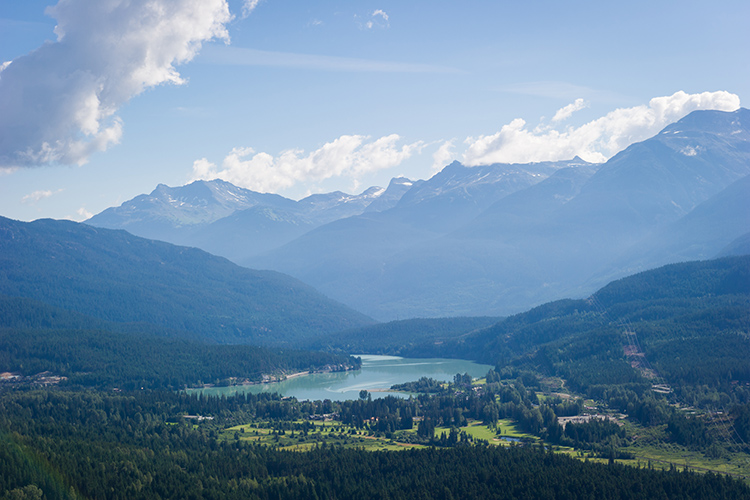
One way to connect with Whistler’s sustainability efforts is via AWARE (Association of Whistler Area Residents for the Environment), which hosts events throughout the year. Coming up is their Earth Week events, which start April 17, 2024. Other community initiatives they work on are Whistler’s community gardens and greenhouses, zero waste workshops in schools and their social enterprise, Zero Waste Heroes, which helps events minimize their waste when they come to Whistler.
There’s much to uncover when it comes to Whistler’s passion for the environment, strike up a conversation with your tour guide, chairlift buddy or barista and you’re likely to hear even more stories and tips. Thank you for thinking about a sustainable summer stay, we look forward to seeing you!
Save up to 20% on lodging with Whistler.com this summer. Stay & Golf from $289 CAD per person, per night or Stay & Bike from $179 CAD per person, per night. Sign up to be a Rewards Member (for BC and WA residents only) and receive a FREE $50 CAD activity voucher on stays of 3+ nights.
You can also win a summer trip to Whistler with the Escape the Ordinary contest!
